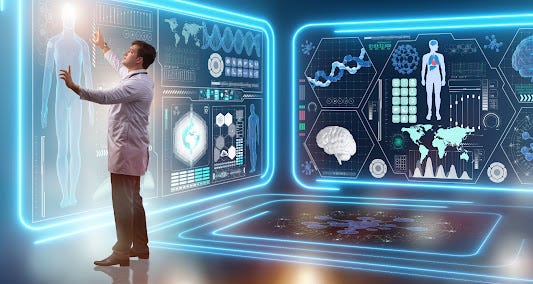AI's Transformation of Healthcare: Enhancing Diagnosis and Treatment
In the landscape of modern healthcare, the integration of artificial intelligence (AI) is reshaping traditional practices, bolstering efficiency, accuracy, and patient outcomes. From revolutionizing diagnosis procedures to refining treatment plans, AI is playing an increasingly pivotal role in every facet of the healthcare continuum. This article explores how AI is revolutionizing healthcare, from diagnosis to treatment, and the profound impact it's making on patients and practitioners alike.
AI in Diagnosis: Augmenting Precision and Speed
One of the most significant contributions of AI in healthcare lies in its ability to augment diagnostic processes. With advanced machine learning algorithms and deep learning techniques, AI systems can analyze vast amounts of medical data, including imaging scans, genetic information, and patient records, to detect patterns and anomalies that may elude human perception.
Applications of AI in Diagnosis:
1. **Medical Imaging**: AI-powered image analysis systems can assist radiologists in interpreting medical images such as X-rays, MRIs, and CT scans, leading to more accurate and timely diagnoses of conditions like tumors, fractures, and cardiovascular diseases.
2. **Early Disease Detection**: AI algorithms can identify subtle biomarkers and early signs of diseases, enabling early intervention and improved prognosis for conditions like cancer, diabetes, and Alzheimer's disease.
3. **Risk Prediction**: AI models can analyze patient data to predict the risk of developing certain diseases or medical complications, allowing healthcare providers to implement preventive measures and personalized treatment plans.
AI in Treatment: Personalizing Care and Optimizing Outcomes
Beyond diagnosis, AI is revolutionizing the treatment landscape by enabling personalized and targeted interventions tailored to individual patient needs. By leveraging patient data, clinical knowledge, and real-time monitoring, AI-driven systems can optimize treatment protocols, enhance medication management, and streamline surgical procedures.
Applications of AI in Treatment:
1. **Precision Medicine**: AI algorithms analyze genetic, clinical, and lifestyle data to customize treatment plans and medication dosages for individual patients, maximizing efficacy and minimizing side effects.
2. **Drug Discovery**: AI accelerates the drug discovery process by predicting molecular interactions, identifying potential drug candidates, and optimizing drug designs, leading to the development of novel therapies for various diseases.
3. **Surgical Robotics**: AI-powered surgical robots assist surgeons in performing complex procedures with precision, dexterity, and minimal invasiveness, reducing surgical complications and recovery times.
4. **Remote Patient Monitoring**: AI-enabled wearable devices and remote monitoring systems track patient vital signs, medication adherence, and disease progression in real-time, facilitating proactive intervention and remote care management.
The Future of AI in Healthcare: Opportunities and Challenges
As AI continues to advance, its potential to revolutionize healthcare is boundless. However, along with its promises come significant challenges and ethical considerations that must be addressed. These include issues related to data privacy, algorithm bias, regulatory compliance, and the need for transparent decision-making processes.
Conclusion
AI is poised to transform healthcare in unprecedented ways, ushering in an era of personalized medicine, proactive healthcare management, and improved patient outcomes. By harnessing the power of AI-driven technologies, healthcare providers can enhance diagnostic accuracy, optimize treatment strategies, and deliver more effective and patient-centric care. As we navigate the evolving landscape of AI in healthcare, it's essential to embrace innovation responsibly, ensuring that technology serves as a catalyst for positive change and equitable access to quality healthcare for all.
